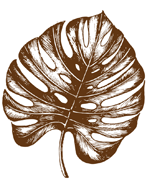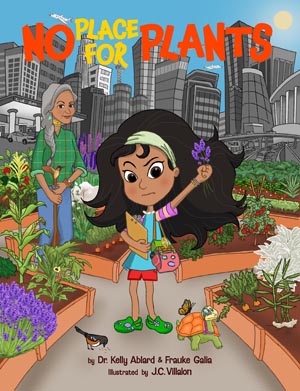No Place for Plants is a vibrant children’s book about Pukuu’, an 8-year-old Native American girl in Los Angeles, on a mission to save her community garden.
No Place for Plants is a children’s book about plant advocacy, cultural heritage, leadership, and scent memories, written by Airmid Institute CEO, Dr. Kelly Ablard and Smell Coach, Certified Aromatherapist, podcaster and founder of The Smell Gym, Frauke Galia.
No Place for Plants delivers a timeless message about the role of nature in our lives, the importance of preserving and honoring the natural world, and that we are all one.
Dr. Ablard will donate 5% of net sales proceeds to the Junior Airmid Ambassador Program. Order your copy of No Place for Plants today!
Book Summary
No Place for Plants is a vibrantly illustrated children’s picture book that tells the story of a modern day 8-year-old Native American girl from Los Angeles, California named Pukuu’ who is on a mission to save her community garden.
Every Sunday, Pukuu’, her wise grandmother Ashuuk, and their pet desert tortoise Paa’ar walk to their community garden to spend time with their friends, including the plants, animals, and insects. But one Sunday, as they are walking to the garden, smelling the plants along the way, they arrive there to find some no-good, absolutely terrible news that could change everything.
Pukuu’, with the guidance of Ashuuk and Paa’ar, embark on an unforgettable journey that reminds us of the importance of community and our connection to Nature.

The Children’s Book That Meets The Moment
There is no more urgent time than now. Biodiversity is in crisis, there’s a lack of green space from urbanization, Nature-deficit disorder is rising, cultural sustainability is highly threatened, and our sense of smell continues to be ignored from an early age.
The good news?
Children intuitively understand we are part of the natural world. And they instinctively use their senses to explore. They’re naturally curious and are filled with wonder. This story connects both the adult reader and the young child with those emotions.
No Place for Plants engages the child, and adult alike, to be stewards of the plants, passionate ambassadors for the natural world, and active smellers, while acknowledging that Native Americans have been this all along.

A Story With A Timeless Message
No Place for Plants takes young audiences on a heartfelt journey of resilience, community, and the profound connection between humans and Nature.
Through vivid descriptions and captivating imagery, placed against the contrast of a gray concrete jungle, the book transports readers into Pukuu’s world, where they can feel the warmth of the sun, smell the fragrant plants, and witness the wonders of the natural world. The colorful illustrations bring the characters and the community garden to life, captivating young imaginations and fostering a deeper engagement with the story.
The story addresses important themes such as the significance of community spaces and the impacts of urban development on the environment. The book sparks empathy and encourages children to appreciate the value of green spaces and advocate for them in their own lives.
At its core, No Place for Plants emphasizes the power of unity and determination. It highlights the importance of working together, standing up for what you believe in, and making a difference through collective effort. It instills in children the belief that their voices matter and that they too can contribute to positive change in their communities.
Ultimately, the book delivers a poignant message about the enduring power of scent memories and the irreplaceable role that Nature plays in our lives. It showcases the profound impact of a garden on individuals and communities, reminding readers of the importance of preserving and honoring the natural world.
This is a book for every child, everywhere, for all time.

Why is Airmid Institute involved?
As the world continues to become more urbanized, the consequent disconnection with Nature has led to a prevalent condition identified by two botanists in 1999 known as plant blindness. Plant blindness is the inability to identify among plant species and to appreciate plants’ value, and has led to nature-deficit disorder. This detachment is suggested to be one of the key factors directly and indirectly affecting the current loss of biodiversity never before seen in human history.
Hughes et al., (2019 in Dasgupta, 2021) found that this disconnection with Nature increases over time from childhood into the teen years and can persist throughout one’s life; hence why education about Nature for young school children is critical if we want to preserve medicinal and aromatic plants – and their use in traditional medicine – for future generations.
Nature cannot speak for itself. Ultimately, individuals responsible for driving biodiversity to extinction are untraceable; and there is no law that completely holds individuals accountable for their daily treatment toward Nature. For this reason, we will need to rely on self-enforcement, which cannot happen without creating an environment to connect with Nature beginning at an early age (Dasgupta, 2021).
This is a key reason why Airmid Institute values and recognizes the vital need for this type and level of education, and invites you to share this message to support the conservation and sustainability of medicinal and aromatic plants (MAPs), and the Junior Airmid Ambassador Program through the purchase of No Place for Plants.
5% of Dr. Ablard’s net sales proceeds will be contributed to the Junior Airmid Ambassador Program.
Dasgupta, P. (2021), The Economics of Biodiversity: The Dasgupta Review. Abridged Version. (London: HM Treasury).

Please join us!
No Place for Plants comes as an ebook, paperback, and hardcover book. Please visit amazon.com, Barnes and Noble, or www.pukuuoneworld.com to get your copy today and join us in helping to connect young children with nature.



